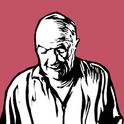“Were you cool, then?” my wife asked me the other day. By “then,” she meant during those years before our fortunes came to be intertwined. I think a little bit of milk chocolate Hobnob may have lodged in my windpipe as I attempted to answer, because what came out was something like: “Huarrghgh-hah-haarghnoyoumustbefeckingJOKING...”
And that was not a word of a lie. Even among the distinctly uncool members of my peer-group—we were pigeon-toed rugby-dodgers to a man, and the closest we came to a fashion moment was an inexplicable sheep-like craze for KP Skips—I was a sorry specimen. In my mid-teens, I wore dungarees and primary-coloured granny-tops. Even expressing an appreciation of the concept—“Cooo-ELL!” I once exclaimed excitedly—was enough to cause me to be mocked for months afterwards.
But the inquiry, and the associated reminiscences, did make me think. I know most of the really seriously uncool things I did and said were done and said in an attempt to be cool. Who was cool? Who’s cool now?
We knew who was cool. Clint Eastwood: he was cool. He was maybe a bit less cool when, as mayor of Carmel-by-the-Sea, he found himself concerned with local bye-laws about the public eating of ice cream. But apparently he was once asked on live television by Terry Wogan about his reputation for being cool. In response, he flicked a cigarette out of a packet in his top pocket, caught it in his mouth and—without missing a beat—replied: “What do you mean by ‘cool’?” That’s peak cool. This is almost certainly a legend, but the fact it attaches to him tells a story.
Who else was cool? David Bowie, Lou Reed, James Dean? Yes. On the distaff side Patti Smith, Deborah Harry and Catherine Deneuve. Christian Slater pretending to be Jack Nicholson in Heathers was cool, or, at least, aiming for it. And The Fonz in Happy Days was—well—an uncool person’s idea of a cool person; he was just too good-natured. All of which—the successes and the misfires and the urban legends—indicate a direction of travel.
Cool, in the traditional paradigm, is a bit paradoxical: it gift-wraps extreme personal vanity in an affectation of indifference. I don’t care what you think of my haircut: but it so happens I have an absolutely astonishing haircut anyway, so suck it, losers.
Accordingly, I start to wonder whether cool has vanished from the world; has been altogether mothballed as a concept, like the Steady State theory of cosmology, or Betamax. Of course, there is on the one hand the old geeks-have-inherited-the-earth thing: the titans of the last couple of decades have been the likes of Bill Gates and Mark Zuckerberg. David Foster Wallace, the avowed enemy of irony, helped do for cool in literature. The pop world is run by Simon Cowell.
But I’m talking, more, about something structural. In the age of the selfie, the second half of the quasi-paradox of coolness has more or less collapsed. To be reserved and indifferent to applause, while being looked upon nevertheless, which is the sine qua non of old-style cool, is in a distinct bear market. If you aren’t puppyishly presenting yourself to the world, you’re not cool: you’re invisible.
It’s a theory, but it seems to me to be borne out by the evidence; and not just the pop and television stars. Earnestness is what all politicians now seek to project: Jeremy Corbyn is anti-cool; David Cameron seeks to play down any suggestion of coolness. Barack Obama is, or was, pretty nearly cool and it counted terribly against him; while Donald Trump, the absolute antipole of coolness, possibly the uncoolest person in the universe, was, when I last checked, the favourite for the Republican nomination.
We’re living in a post-cool world. More evidence of global warming, I suppose.

Carmine Rojas, David Bowie, and Nile Rodgers in Aschaffenburg, 1983. © Mark Vitullo
Is anything still cool?
We’re living in a post-cool world. More evidence of global warming, I suppose.
November 12, 2015











